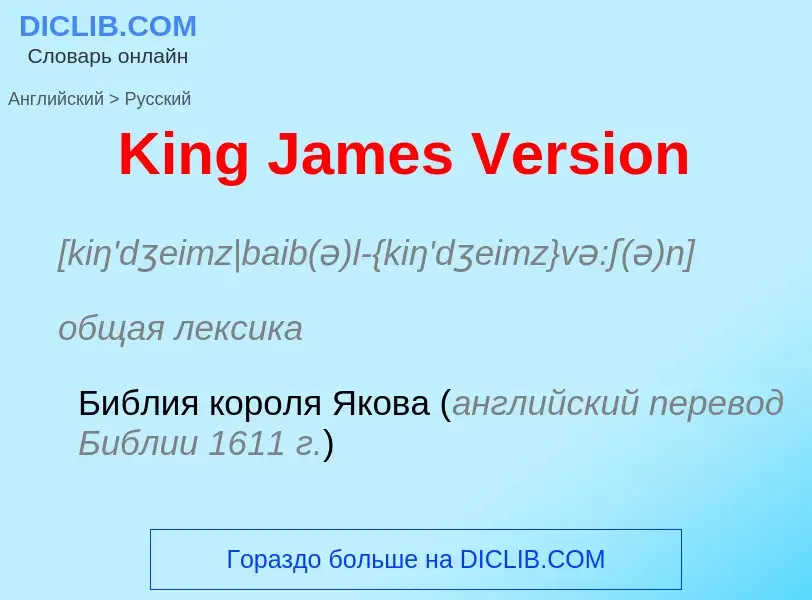Перевод и анализ слов искусственным интеллектом ChatGPT
На этой странице Вы можете получить подробный анализ слова или словосочетания, произведенный с помощью лучшей на сегодняшний день технологии искусственного интеллекта:
- как употребляется слово
- частота употребления
- используется оно чаще в устной или письменной речи
- варианты перевода слова
- примеры употребления (несколько фраз с переводом)
- этимология
King James Version - перевод на русский
[kiŋ'dʒeimz|baib(ə)l-{kiŋ'dʒeimz}və:ʃ(ə)n]
общая лексика
Библия короля Якова (английский перевод Библии 1611 г.)
[,kɪŋ'dʒeɪmz,baɪbl]
общая лексика
Библия короля Якова
Библия короля Якова (английский перевод Библии 1611 г.)
синоним
[,ɔ:θəraɪzd'və:ʃtn]
общая лексика
"Авторизованная версия" (английский перевод Библии 1611, кот. пользуется большинство англиканских церквей)
перевод был одобрен королём Яковом
«Официальный вариант» (английский перевод Библии 1611 г., одобренный королём Яковом)
синоним
Определение
---
(James) Генри (1843-1916) , американский писатель. Брат У. Джемса. Социально-психологические повести и романы ("Дейзи Миллер", 1878; "Женский портрет", 1881; "Послы", 1903) о трагедийных поисках любви и понимания на фоне сопоставления американских и европейских культурных традиций. Тема художника ("Письма Асперна", 1888; "Урок мастера", 1892). Психологизм на грани "потока сознания" и изощренная повествовательная техника поздних романов ("Крылья голубки", 1902; "Золотая чаша", 1904). Теоретик литературы (кн. "Мастерство романа", 1934). Пропагандировал творчество И. С. Тургенева.
Википедия

The King James Version (KJV), also the King James Bible (KJB) and the Authorized Version, is an Early Modern English translation of the Christian Bible for the Church of England, which was commissioned in 1604 and published in 1611, by sponsorship of King James VI and I. The 66 books of the King James Version include 39 books of the Old Testament, and the 27 books of the New Testament. Noted for its "majesty of style", the King James Version has been described as one of the most important books in English culture and a driving force in the shaping of the English-speaking world.
The KJV was first printed by John Norton and Robert Barker, who both held the post of the King's Printer, and was the third translation into English language approved by the English Church authorities: The first had been the Great Bible, commissioned in the reign of King Henry VIII (1535), and the second had been the Bishops' Bible, commissioned in the reign of Queen Elizabeth I (1568). In Geneva, Switzerland, the first generation of Protestant Reformers had produced the Geneva Bible of 1560 from the original Hebrew and Greek scriptures, which was influential in the writing of the Authorized King James Version.
In January 1604, King James convened the Hampton Court Conference, where a new English version was conceived in response to the problems of the earlier translations perceived by the Puritans, a faction of the Church of England.
James gave the translators instructions intended to ensure that the new version would conform to the ecclesiology, and reflect the episcopal structure, of the Church of England and its belief in an ordained clergy. The translation was done by 6 panels of translators (47 men in all, most of whom were leading biblical scholars in England) who had the work divided up between them: the Old Testament was entrusted to three panels, the New Testament to two, and the Apocrypha to one. In common with most other translations of the period, the New Testament was translated from Greek, the Old Testament from Hebrew and Aramaic, and the Apocrypha from Greek and Latin. In the 1662 Book of Common Prayer, the text of the Authorized Version replaced the text of the Great Bible for Epistle and Gospel readings (but not for the Psalter, which substantially retained Coverdale's Great Bible version), and as such was authorized by Act of Parliament.
By the first half of the 18th century, the Authorized Version had become effectively unchallenged as the English translation used in Anglican and other English Protestant churches, except for the Psalms and some short passages in the Book of Common Prayer of the Church of England. Over the course of the 18th century, the Authorized Version supplanted the Latin Vulgate as the standard version of scripture for English-speaking scholars. With the development of stereotype printing at the beginning of the 19th century, this version of the Bible had become the most widely printed book in history, almost all such printings presenting the standard text of 1769 extensively re-edited by Benjamin Blayney at Oxford, and nearly always omitting the books of the Apocrypha. Today the unqualified title "King James Version" usually indicates this Oxford standard text.


![[[John Speed]]'s ''Genealogies recorded in the Sacred Scriptures'' (1611), bound into first King James Bible in [[quarto]] size (1612) [[John Speed]]'s ''Genealogies recorded in the Sacred Scriptures'' (1611), bound into first King James Bible in [[quarto]] size (1612)](https://commons.wikimedia.org/wiki/Special:FilePath/1612 First Quarto of King James Bible.jpg?width=200)

![The opening of the [[Epistle to the Hebrews]] of the 1611 edition of the'' Authorized Version'' shows the original [[typeface]]. Marginal notes reference variant translations and cross references to other Bible passages. Each chapter is headed by a précis of contents. There are decorative initial letters for each chapter, and a decorated headpiece to each book, but no illustrations in the text. The opening of the [[Epistle to the Hebrews]] of the 1611 edition of the'' Authorized Version'' shows the original [[typeface]]. Marginal notes reference variant translations and cross references to other Bible passages. Each chapter is headed by a précis of contents. There are decorative initial letters for each chapter, and a decorated headpiece to each book, but no illustrations in the text.](https://commons.wikimedia.org/wiki/Special:FilePath/Kjv-hebrews.png?width=200)
![[[Archbishop]] [[Richard Bancroft]] was the "chief overseer" of the production of the Authorized Version. [[Archbishop]] [[Richard Bancroft]] was the "chief overseer" of the production of the Authorized Version.](https://commons.wikimedia.org/wiki/Special:FilePath/Richard Bancroft.png?width=200)
![[[William Tyndale]] translated the New Testament into English in 1525. [[William Tyndale]] translated the New Testament into English in 1525.](https://commons.wikimedia.org/wiki/Special:FilePath/William Tyndale.jpg?width=200)
